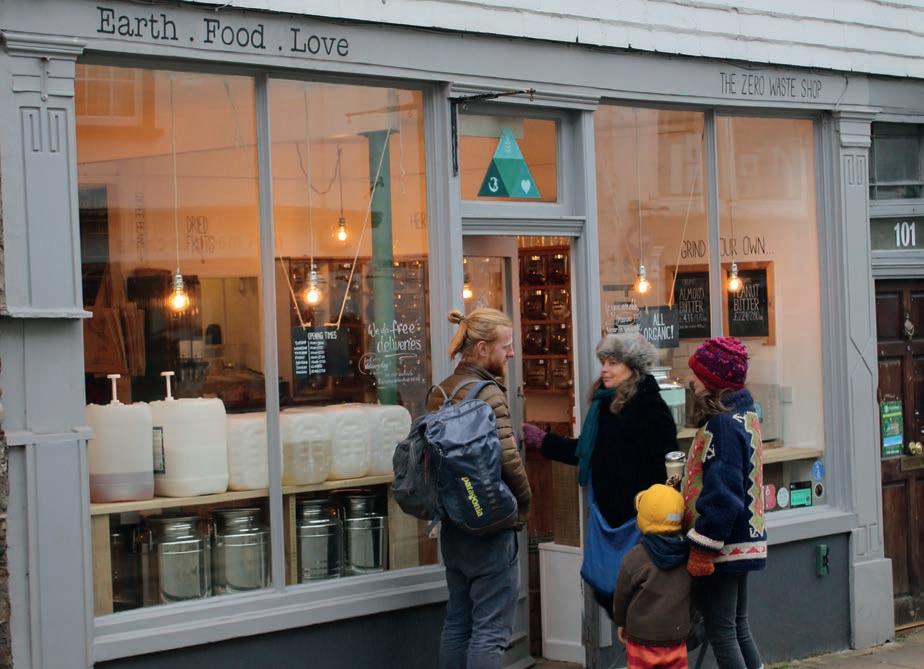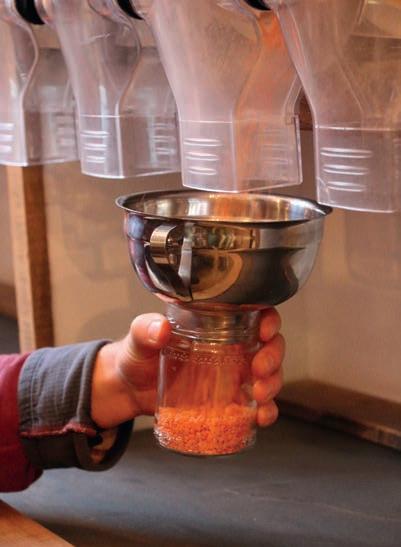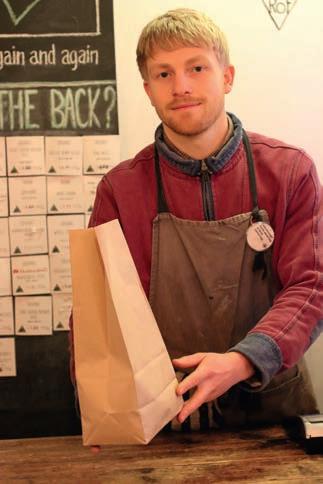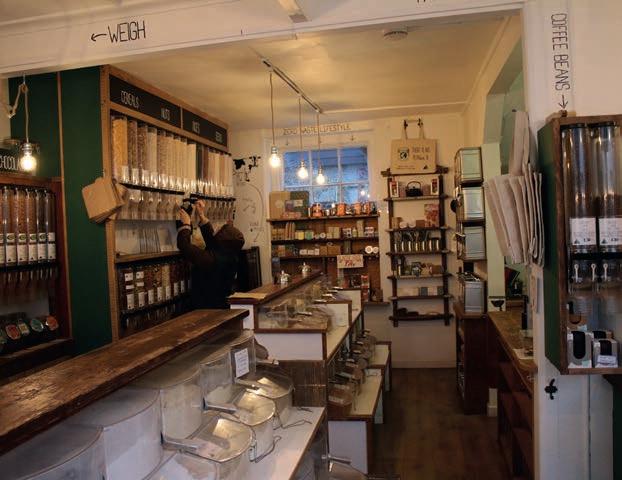
9 minute read
DELI OF THE MONTH
from FFD March 2021
In 2017, Richard and Nicola Eckersley took a leap of faith with Richard leaving behind his career in professional football to pursue the more wholesome dream of opening the UK’s rst zero-waste shop. Now, their Devon-based operation Earth.Food.Love is inspiring re llable retailing around the world.
Interview by Michael Lane
Where the jars are more than half-full
YOU’VE HEARD THE one about the banker who quit the city to open a cheese shop. Or the story of the management consultant who cashed in their savings to set up a deli-café. But what about the professional footballer who hung up his boots and founded the country’s rst zero-waste shop?
“It sounds a bit crazy, doesn’t it?” says Richard Eckersley, who runs Earth.Food.Love. in Totnes with his wife Nicola. “I was getting disillusioned with football and knew that I was coming to the end of my time, even though I was only 27. We just wanted a di erent life.”
In truth, the tale of how Eckersley, who began his career at Manchester United, came to be loading up silos of oats and pulses in a small Devon town is quite well-documented – through countless magazine and newspaper pro les published when the shop rst opened.
But now the novelty of his post-football career move has worn o , it appears that the business idea was a good one. The shop is just shy of four years old, it has a healthy £250,000 annual turnover and – even on the bitterly cold February day that FFD visits – customers will still wait patiently to get inside.
Not only is Earth. Food. Love a feasible business, it has also now proved to be a trailblazer and a blueprint for other similar retailers who have since set up.
“Was it viable? I didn’t know at the time,” says Richard. “Luckily I had money from football and thought I’ll put it into it and see what happens. It’s been sustainable and it’s standing on its own two feet.”
Back in 2016, the plan to dispense loose products hadn’t fully formed in the Eckersleys’ minds. A er holidaying in Devon they knew that they wanted to move from Manchester to Totnes. The town is well-known for its independent residents (it once had its own currency) and its love of sustainable practices. And ever since Richard’s playing stint in the US, the couple had been embracing a more environmentally conscious lifestyle, including organic food and veganism.
As it happens, the problem of plastic waste was sounding a chord with them at that time. Richard was having to drive their recycling to a centre in Manchester, because their apartment block didn’t even have the bins for it.
“I thought ‘There must be another way of
VITAL STATISTICS
Turnover: £250,000 Number of lines: 300 Staff members: 5 Quantity of jumbo oats sold: 35kg per week

MUST-STOCKS
Oats (Infinity) Basmati rice (Infinity) Hodmedods British Quinoa Red lentils (Infinity) Chickpeas (Infinity) Dried mango (Infinity) Ombar chocolate buttons (ombar) Peanut butter (Infinity) Maple syrup Rerooted plant milks

doing this’,” he says. “‘How can we have all these bottles that people accumulate over the year and we can’t re ll them? How is that even a thing in this country?’ That was the start.”
Several years on, the couple is very clear about what the mission is. “A zero-waste lifestyle is where a circular economy replaces a linear economy,” says Nicola Eckersley. “We personally prefer the term ‘striving for zero waste’, as we can all only do our best. But if you follow the 5Rs (refuse, reuse, repair, recycle, rot), then you will dramatically reduce the waste you produce.”
Researching the retail concept to promote this lifestyle wasn’t exactly easy because nothing like it existed in the UK. Having seen photos of a Berlin shop called Unverpackt online and done a reccy of some chocolate dispensing units at the back of a London health store, the couple just went for it and opened the shop in March 2017.
Richard’s savings from football were enough to cover the sourcing of specialist dispensing silos and units, as well as tting out the shop, purchasing glassware and some £10,000 in initial stock. Once they had invested in branding and a till system, he estimates that setting up cost in excess of £40,000.
Even if they had wanted to borrow start-up funds, he says that there was no proven business model to show to lenders. And, besides this, the Eckersleys’ ambitions were modest.
“It wasn’t about ‘We’re going to open this shop then we’re going to open three more, then four more, then ve more.’”
“Actually we had six months running it and thought ‘Wow, it’s quite successful, we’re taking a wage already, this is weird (from a new business standpoint). Then we were like ‘What we’re going to do is allow this to roll out across the country but let other people do it’.”
Any retailer or potential retailer can download the Earth. Food. Love guide to setting up a zerowaste shop from the business’s website. And, the couple has been contacted by entrepreneurs from across the UK and beyond, including Australia, South Africa and Canada, with tales of how this document inspired them.
“So, everyone’s got their own little businesses, but independent, which is just what we wanted to see: independent businesses moving back onto the high street.”
One of the more interesting points that the document makes for those looking to set up is about how you approach stocking a re llables shop. “All zero-waste shops cater to people who want to eliminate plastic packaging from their lives,” it says. “But not all have to cater to the same crowd.”
Earth. Food. Love very much plays to its audience in Totnes, which is home to lots of organic enthusiasts, and vegetarians. The range of pulses, cereals and nuts in its silos are all 100% organic and everything in the shop is plant-based. The o er includes a variety of ours and spices, oils and vinegars, teas and co ee and chocolates. There’s also a make-your-own nut butter station, washing detergents on tap and a small fridge for

plant-based mylks and maple syrup.
In total, there are more than 300 lines crammed into the rustically tted out 350sq retail space. The goal is that customers should be able to buy everything for their storecupboard and then head to the greengrocer and butcher up the high street to complete a plastic-free shop.
Four years in business is a testament to the success of this product mix. Despite COVID and the Baltic weather rendering Totnes virtually empty in February, the warm glow from the store’s Edison bulb lighting welcomes a variety of customers in. FFD witnesses pensioners, mums with children and even customers you might pigeonhole as millennials. One customer with a basketful of oils, cereals and our says: “There are some people that move to the area to shop in places like this.”
But Richard Eckersley says Earth.Food.Love is a broad church customer-wise. “I’m shocked at the di erent types of people that come here,” he says. “Initially I thought it would just be organic, earthy people who drink hemp milk and all that jazz, but it’s a mixed bag.”
While there are plenty that t the health food shop pro le, there are also families who come in to bulk buy and former Londoners that Eckersley describes as “quite mainstream”.
Plenty of these customers might do a £30 shop and only come back to do the same two weeks later. What all these customers have in common is they experience the same simple purchasing process – you weigh your container, ll it, weigh it again and the scales print a price sticker – and they are getting value for money.
“Every product in a re llable shop (at least ours anyway) is cheaper than buying prepackaged in another store,” says Nicola Eckersley. “We buy in bulk, and therefore receive a discount, and we pass this on directly to our customers.”
Although the process of re- lling the silos and other dispensers from 25kg bags is trickier than stacking a shelf, there are bene ts in this format for the retailer too. Stock management is remarkably simple. When a member of sta empties a bag, they just chalk it up on a board in the back room and it will go on the next order. Top-sellers like jumbo oats (35kg-plus is sold most weeks) are ordered regularly regardless.
Ordering is relatively straightforward, too, with wholesalers like In nity and Essential providing the bulk goods and the odd few lines sourced direct from producers.
The only problem the Eckersleys now have is where to put any additional lines.
“We’ve got a whole new shop in the back that no one knows about,” says Nicola, gesturing towards a list on a big blackboard behind the till. “That’s what we can’t t on the shop oor.”
Richard adds: “We are at capacity right now. That’s the only reason we’d want to move – if we wanted to stock more things – we love this shop.”
While the couple would never move outside of the town, they may need to start looking for that bigger unit given their designs on expanding the o er with more liquids and moving beyond ambient goods.
“Everything can be stored loose in the right conditions,” says Richard. “It’s just having the space to create that environment – like having a deli counter to hold loose tofu, tempeh, sauerkraut, hummus even.”
“Truth be told, I’ve seen lots of di erent versions of these shops. Some have done it to a high, really professional standard, and others have done it in a more of a village shop way. Everyone can set one up within their realm and budget. Just because we did it like this doesn’t mean you have to do it this way.”
Given the pandemic and with two young daughters, Earth.Food.Love’s owners are in no hurry to disrupt what they’ve got.
“Our favourite saying when we were starting the shop was ‘we’ll gure it out’,” says Richard. “And we still say the same thing to each other today.” You can’t say it hasn’t served them well so far.
thezerowasteshop.co.uk



I’m shocked at the di erent types of people that come here. I thought it would just be earthy people, but it’s a mixed bag.









